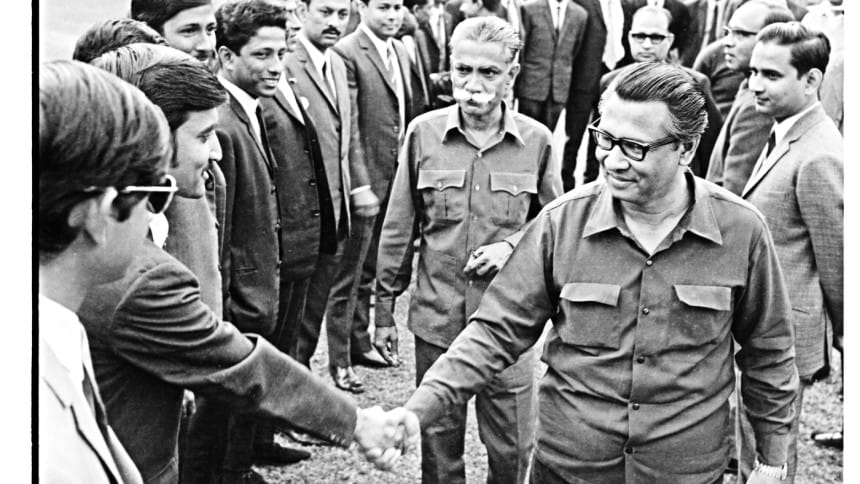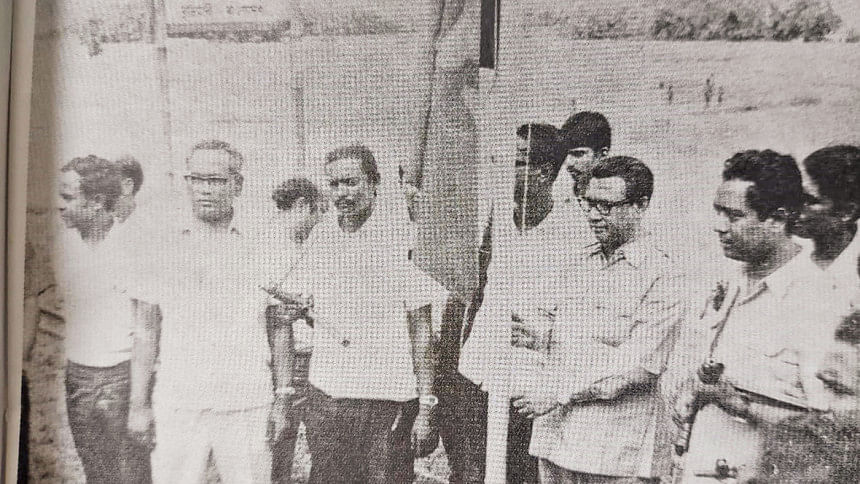A man hard to find

Tajuddin Ahmad (1925–1975) was the Prime Minister of Bangladesh during the Liberation War and the first Prime Minister of post-war independent Bangladesh. After the war, he returned to the newly independent country and assumed office as Prime Minister. However, on 10 January 1972, when the Father of the Nation, Bangabandhu Sheikh Mujibur Rahman, returned to Bangladesh from a Pakistani prison and became Prime Minister, Tajuddin Ahmad was appointed as the Finance and Planning Minister in his cabinet.
Tajuddin Ahmad was tragically killed in jail on 3 November 1975. His life was cut short at the age of 50. Yet, in this brief life, he had the rare opportunity to perform great service to his country — and he made full use of it.
On 20 December 1971, Time magazine published a cover story titled "Bangladesh: Out of War, a Nation Is Born" about the country's liberation. In it, they wrote of Tajuddin Ahmad:
"Tajuddin Ahmad, 46, Prime Minister, a lawyer who has been a chief organiser in the Awami League since its founding in 1949. He is an expert in economics and is considered one of the party's leading intellectuals."
Tajuddin Ahmad was born on 23 July 1925, in Dardaria village of Kapasia upazila in the Gazipur district near Dhaka. His life can be viewed in four distinct phases:
Phase I: 1925–1947 – Formative Years
From his birth in 1925 to 1947, these 22 years marked his early development. During his school and college years, he became deeply engaged in politics, driven by a strong desire to serve the people. From a young age, he was clear about his future goals.

He studied in maktabs, schools run by Muslim and Hindu teachers, and Christian missionary schools offering both Bengali and English medium instruction. This diverse educational background gave him a liberal, cosmopolitan outlook, influenced by many religions and ideologies.
However, this liberalism was not unchecked. He deeply respected the social and religious values of his community. He embodied values such as integrity, justice, simplicity, discipline, honesty — both financial and moral — respect for others, a deep sense of social responsibility, and an unwavering work ethic. These principles became the hallmarks of his life, from which he never wavered.
The partition of India in 1947, and the painful events that accompanied it, left a deep impression on him. It inspired him to engage in progressive politics, and although many of his peers were drawn towards communism, he chose to work within the Muslim League to reform it from within and fight for people's rights.
Two influential figures shaped his early political journey: Abul Hashim (1905–1974), a progressive intellectual from Kolkata, and Kamruddin Ahmad (1912–1982), a prominent advocate of liberal politics in Dhaka.
Kamruddin Ahmad, in his book Banglar Moddobitter Attobikash – Volume 2, wrote:
"Party House was formed on 1 April 1944, at No. 150 Chowk Mugholtuli in Dhaka with the inspiration of Abul Hashim Sahib.… Among the full-time workers were four people – Shamsul Haque, Shamsuddin, Tajuddin Ahmad, Mohammad Shawkat Ali.… We later took responsibility for running the Hushiar weekly news magazine. I received the most support from Tajuddin Ahmad. He was a very silent worker, always staying behind the scenes, and many people never realised his capabilities."
Phase II: 1947–1971 – Rise in Politics
The 24 years from 1947 to 1971 were central to his socio-political life. During this time, he was actively involved in the Language Movement, documenting events meticulously in his diary.
For example, on 11 March 1948, he wrote:
"Woke up at 6 in the morning, went out for the general strike at 7 and first went to Fazlul Haque Muslim Hall. Mr Toaha and I worked together. Toaha Sahib and some others were arrested near the Ramna Post Office. I narrowly escaped arrest. Later, he was released.
After the picketing ended at noon, a meeting was held at 1 p.m. on university grounds under Naeemuddin Sahib's chairmanship.
When the procession headed toward the Secretariat at 2 p.m., it was blocked near the High Court gate. We moved toward the north gate where the police launched a lathi charge. Toaha Sahib was severely beaten.
Sheikh Mujib, Shamsul Haque, Mahbub, Oli Ahad, Shawkat, Ansar, and 69 others were arrested. Fourteen were hospitalised. I met them at Central Jail, Kotwali and Sutrapur police stations, and the hospital. Returned to the hall by 8 p.m."
Special note: "Today's strike was a resounding success despite police brutality and hired thugs."
In 1954, he became an MLA of the United Front, defeating the powerful Secretary General of the East Bengal Provincial Muslim League. In 1966, he was instrumental in launching the Six-Point Movement. As General Secretary of the Awami League, he played a vital role in the non-cooperation movement and political negotiations with the Pakistani regime.
Always humble and low-profile, he worked tirelessly for independence alongside Bangabandhu Sheikh Mujibur Rahman.
Phase III: 25 March – 16 December 1971: The Liberation War
These nine months marked the most intense and defining chapter of his life.
In the absence of Bangabandhu, who was imprisoned in Pakistan, Tajuddin Ahmad led the first government-in-exile of Bangladesh and oversaw the Liberation War. Under his leadership, the government achieved two historic victories:
1. Liberation of Bangladesh
2. Bringing back Bangabandhu alive and with dignity
Despite tremendous odds, betrayals, and international conspiracies, Tajuddin Ahmad's courage and leadership helped secure victory.
Phase IV: 1972–1975 – Statesmanship and Martyrdom
After independence, when Bangabandhu became Prime Minister, Tajuddin Ahmad served as Finance Minister. He was instrumental in rebuilding the nation from the ruins of war.
On 26 October 1974, he resigned from the cabinet. Though no longer in official party leadership, he remained committed to holding the government accountable. He never compromised on principles, which alienated him from many within his own party.
In a famous speech on 20 January 1974, at the closing session of the Awami League's biennial council, he stated:
Everyone says, 'thief, thief, thief.' But who are the thieves? In the last two years, I haven't heard a single worker say that their uncle stole relief rice.
But when someone is arrested for corruption, that same worker comes to my house saying, 'Tajuddin Bhai, my uncle was arrested — please help get him out.'
I ask, 'Didn't you hear what I said in my speech?'
He replies, 'That was a speech for the organisation; now please save my uncle.'
This is the condition of Bangladesh. Where is the social boycott? There should be one against corruption.
After the assassination of Bangabandhu and his family on 15 August 1975, Tajuddin Ahmad was arrested along with other senior leaders. On 3 November 1975, he was murdered in cold blood in Dhaka Central Jail — an event known as the Jail Killing.
At the End
Though trained in economics and law, Tajuddin Ahmad had a deep understanding of history. During the Liberation War, he would say to his comrades:
"Let us work in such a way that when historians write the history of Bangladesh, it will be hard to find our names."
And he often added,
"Erase my name, but let Bangladesh live."
Shuvo Kibria is a senior journalist and political analyst. He can be contacted at [email protected].

 For all latest news, follow The Daily Star's Google News channel.
For all latest news, follow The Daily Star's Google News channel. 



Comments